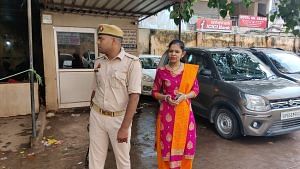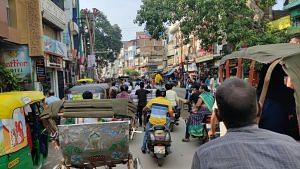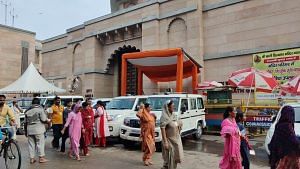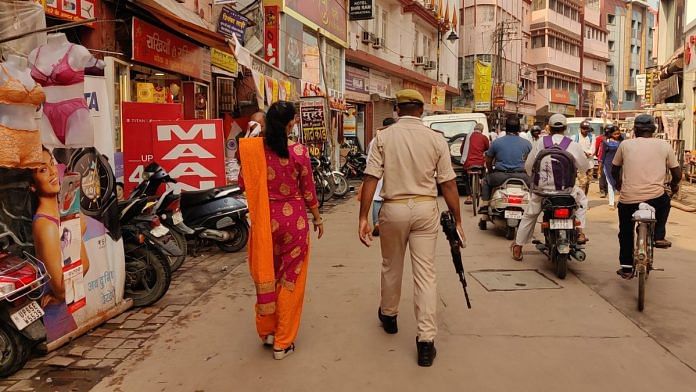Varanasi: Walking briskly next to an armed police guard assigned for her protection, Rakhi Singh navigates her way through bustling alleyways packed with monsoon worshippers in Varanasi. Clad in a bright pink and saffron suit, she confidently enters the Gyanvapi mosque next to the Kashi Vishwanath temple. She is the primary petitioner in a case demanding daily worshipping rights for Hindus inside the Gyanvapi mosque complex, and the reason why its gates have been opened for inspection.
Earlier this month, Rakhi Singh made Varanasi her base for a few days to observe the Archeological Survey of India (ASI)’s ‘scientific survey’ of the Gyanvapi mosque, which a Varanasi court had ordered in July this year.
“I felt at peace and received positive vibes as soon as I entered the complex on the first day [of the ASI survey on 8 August]. Even though the walls were in ruins, I could feel that it was our temple. I was overwhelmed and felt like bowing in front of our Gods like we do in a temple. I was thinking that our Mahadev, who has been trapped for so long, should be freed soon so that the world can know what all is in that building,” she said.
Singh visited each room before being stopped from entering the chamber where namaz was offered. “I was told that women can’t go inside.” She has been visiting the Gyanvapi mosque complex every day, and it strengthens her resolve to devote many more years to the case.

“We can clearly see that all the walls inside the mosque are of the temple. But the domes are of a mosque. The case would end in favour of Hindus. But until then, we can’t stop them [Muslims] from coming to pray,” she said.
This is the first time Rakhi Singh is actively participating in the developments of her case, which was filed with four other petitioners – Lakshmi Devi, Sita Sahu, Manju Vyas, and Rekha Pathak – in 2021. A mother of two children aged 6 and 1.5, the 30-year-old petitioner was eventually accused of being an outlier and a dummy by her co-petitioners. They allegedly called her a “traitor” because of her long absences from Varanasi. Upset with the criticism, Singh wrote an open letter to President Droupadi Murmu last month, seeking permission to end her life.
“In May 2022, the women and their lawyers spread fake news that I am withdrawing my name from the case. Neither I nor my uncle Jitender Singh Bishen made any such statement. By spreading this fake news, they are tagging us as traitors in the Hindu community. We are under immense mental pressure,” she wrote in her letter to Murmu, which she circulated to the media on WhatsApp.

Also read:
Are men to blame?
According to residents closely observing Singh’s case, her co-petitioners aren’t the problem; this mudslinging attempt, they say, is being led by men trying to hog the limelight. Singh granted power of attorney to her uncle Bishen, the founder of Vishwa Vedic Sanatan Sangh, a trust steering some of the cases on Gyanvapi. Meanwhile, advocate Hari Shankar Jain and his son Vishnu Shankar Jain represent the other four petitioners in the case.
The residents claim that the petitioners and their advocates are pursuing these cases to gain “cheap publicity”. The ASI survey order did shift focus back to the Gyanvapi mosque, after all.

“I do not approve of the survey. The petitioners do not know anything about the temple and the mosque. They have agreed to be a part of this case because of publicity,” says Harihar Pandey, a member of the BJP and one of the first persons to move the Varanasi court over Gyanvapi mosque in 1991.
The case has already been regarded as a grand success for Hindus as it crossed the hurdle of maintainability under the 1991 Places of Worship Act in the courts. But cracks have started emerging due to an open divide between the petitioners and lawyers. People closely associated with the case say this divide may impact the outcome in the court and could even go against Hindus.
“The division in the case is leading to the focus being diverted from the Gyanvapi issue to individual publicity. Conflicting applications are given in the court, which will harm the trial in the future. Our larger goal should be to reclaim the temple,” says Bishen.
Also read: Moradabad Muslim massacre 1980: A tale of missing men, memories, Ek Raat Wali Masjid
Split between petitioners
When first admitted to the civil court in 2021, Rakhi Singh’s case created ripples. The five women petitioners and their lawyers cleverly skirted the Gyanvapi land dispute issue and simply demanded a fundamental right – the right to worship inside the mosque.
The five women initially presented a united front for the media. They claimed they “decided to take the matter to court” after meeting at a satsang (prayer meeting). But chinks started appearing soon— while the other four petitioners danced for cameras and appeared on TV debates, Rakhi Singh was nowhere to be seen.
Then, Singh’s lawyers began to clash with the other petitioners’ advocates in the media and in court, where they repeatedly countered each other’s pleas. For instance, at the Varanasi district court, Singh’s lawyers objected to the clubbing of seven cases that touched upon different aspects of Gyanvapi. But the Jains supported it.
“They said that someone else is signing papers on my behalf. Then they clubbed all the cases and diluted those that demanded land and not just worshipping rights,” says Singh.
On 17 August, Bishen wrote an open letter appealing for an out-of-court settlement of the case between Hindus and Muslims, which again brought the advocates at loggerheads with Singh’s camp.
It was against the backdrop of these public disagreements that Singh said she met her co-petitioners for the first time on 8 August, when she went to Gyanvapi to observe the ASI survey. But no words were exchanged between the women.

Entry gate number 4, which has access to the Gyanvapi mosque and the Kashi Vishwanath Temple, has been heavily guarded since the ASI survey began in August | Sonal Matharu, ThePrint
“I didn’t talk to them. They all seemed angry with me, and after all the things they said about me, why should I talk to them?”
ThePrint reached out to the other petitioners, but they declined to comment. Vishnu Shankar Jain also refused to comment on the divide between the two camps.
Also read:
Rakhi’s journey to lead petitioner
Singh was six months pregnant with her second child when she signed on the Gyanvapi court papers. A month-and-a-half later, her daughter was born prematurely. Post-partum recovery and her infant prevented her from visiting Varanasi, Singh said.
But “someone had to come forward for this cause of a Hindu temple,” Singh added, cradling her daughter in her lap.
In the court, the five women pleaded that before the mosque was barricaded in 1993, Hindus conducted regular prayers inside the Gyanvapi mosque compound. They argue that the building has many “visible and invisible gods” and that they must be allowed entry.
“I did not know that the case would become so popular. Like previous cases filed on the matter, I thought this would also be rejected,” Singh said.
Meanwhile, a section of Hindus in Varanasi, who have been closely associated with the temple and the mosque complex, question the credentials of the five petitioners.
“The women who have filed the case never visited the mosque complex. Now, they are trying to enter the case through Shringar Gauri,” says Rajendra Tiwari, mahant (priest) at the Kashi Vishwanath Temple.
Vishwambhar Nath Mishra, head of Varanasi-based NGO Sankat Mochan Foundation, asks: “What is the locus standi of the petitioners, including Singh’s? What interest do these women have? No one knows them. They are mere puppets in the case.”
But Singh refuses to be dismissed as a mere symbolic figure who follows her uncle blindly. She claims she reads all the documents she signs and saves soft copies for reference.
Even though she was born in September 1993, Singh says she has grown up hearing detailed family discussions on the Shringar Gauri pooja issue. This case is for the “larger Hindu cause”, which is why she has chosen to take the plunge.
Her family is from Birpur Bishen village in Gonda, Uttar Pradesh, but Singh was born and raised in Delhi. A graduate in English honours from the University of Delhi, Singh got married a month after turning 18.
Staying with her younger daughter at a budget hotel in Varanasi, Singh says her plea marks the beginning of a larger fight–one that seeks to recover, reclaim, and free “an ancient Hindu temple buried under Gyanvapi.”
Singh comes from a family of litigants. Besides herself, her uncle and his wife, Kiran Bishen, have filed a case of their own. Singh too filed a fresh case in August in the Allahabad High Court, asking spots and areas wherever artefacts and idols are found within the mosque complex to be sealed, barring entry of non-Hindus. The case has been transferred to the Varanasi district court.
For her, the fight for Gyanvapi is a fight for justice.
“If the ASI team finds that there is a mosque, then I will myself appeal to Yogi ji that he should rebuild a mosque there,” she says.
Despite her commitment to the case, Singh cannot seem to wash away her responsibilities as a wife and a mother.
“Women can go to the moon, but first, they should serve tea and breakfast at home.”
(Edited by Zoya Bhatti)



